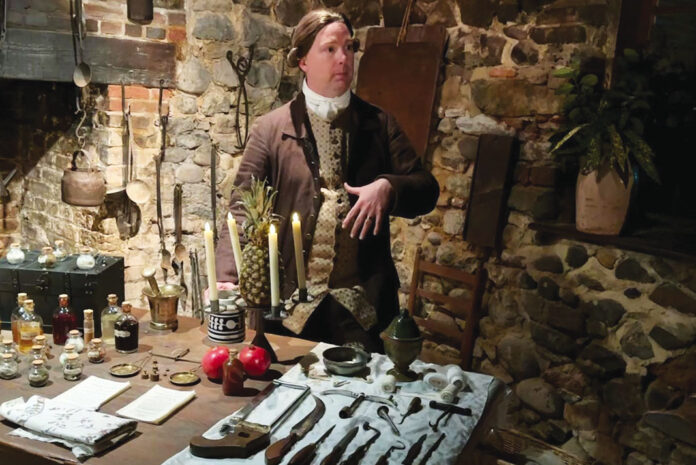By Charles Brett
If you have visited Tryon Palace recently, you may have seen a Physician discussing the latest remedies for a case of consumption, a Surgeon treating soldiers at the camp by way of applying bandages or contemplating amputation, or perhaps called upon the Apothecary for advice on treating an intermitted fever with a preparation of Peruvian Bark found on the shelf in his shop. Tyron Palace has added 18th century medicine as one of its many interpretive trades on site, to include a small trade building next to the kitchen for interpreting the profession of medicine with some of the tools and medicines commonly found in treating illnesses and injuries during the 18th century.
From headaches to upset stomachs, bullet wounds and cases of smallpox, those medical professionals referred to a “Doctor” in the 18th century would have been called upon to consult, provide remedies and prescribe a regime that would address all these disorders and more. The title of “doctor” was given primarily to men in three types of medical professions: Physician, Apothecary and Surgeon. Physicians were university trained and had a vast knowledge of medical theories, chemistry, physics, botany, and diseases. Apothecaries, who were trained to diagnose, prescribe, and produce treatments through an apprenticeship, acted as doctors in the 18th century. They knew little about chemistry but figured out treatments that could address certain symptoms through trial and error — and observation. Though the medical community had not yet discovered caffeine or its properties, for example, apothecaries noticed people who suffered from severe headaches often felt better after drinking a cup of coffee. It was discovered much later that caffeine does not always work to treat this condition.
Apothecaries operated shops in town and sold many of the remedies for common ailments of the 18th century. These remedies were imported into Great Britain from around the world. Patients could purchase them along with household items, like toothbrushes, that might be found in today’s pharmacies. Surgeons were also apprentice trained and would serve mostly with the local militia and later with the Continental Armies. Surgeons were also commonly found onboard ships and practice with the knife as much as treating diseases common among the sailors and sea merchants of the time.
The monthly Outlander tours also focus on 18th century medicine, and Tryon Palace offers special lectures and demonstrations on the topic throughout the year.
The next time you visit Tryon Palace, look to see if the doctor has been called in or the Apothecary shop is open. Maybe our 18th century “doctors” will find a cure to what ails you in the 18th century!

